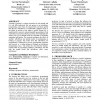Free Online Productivity Tools
i2Speak
i2Symbol
i2OCR
iTex2Img
iWeb2Print
iWeb2Shot
i2Type
iPdf2Split
iPdf2Merge
i2Bopomofo
i2Arabic
i2Style
i2Image
i2PDF
iLatex2Rtf
Sci2ools
117
click to vote
ITICSE
2004
ACM
2004
ACM
Self-efficacy and mental models in learning to program
Learning to program is a unique experience for each student, and it is not fully understood why one person in an introductory programming course learns to program better and more quickly than the next. Self-efficacy is an individual’s judgment of his or her ability to perform a task within a specific domain [1]. A mental model is a person’s internal (mental) representation of real world objects and systems [9]. Research has shown that high selfefficacy and a good mental model are important to knowledge acquisition and transfer. This research investigates the effects of students’ self-efficacy and mental models of programming on learning to program. The results show that self-efficacy for programming is influenced by previous programming experience and increases as a student progresses through an introductory programming course. The results also show that the student’s mental model of programming influences self-efficacy and that both the mental model and self-efficacy affect c...
Related Content
| Added | 30 Jun 2010 |
| Updated | 30 Jun 2010 |
| Type | Conference |
| Year | 2004 |
| Where | ITICSE |
| Authors | Vennila Ramalingam, Deborah LaBelle, Susan Wiedenbeck |
Comments (0)

